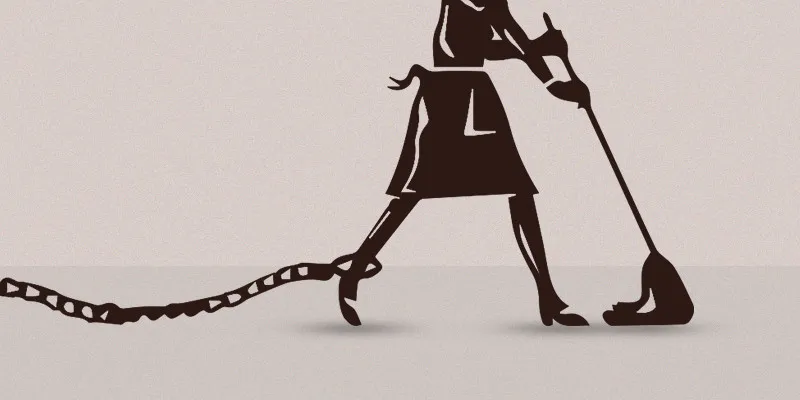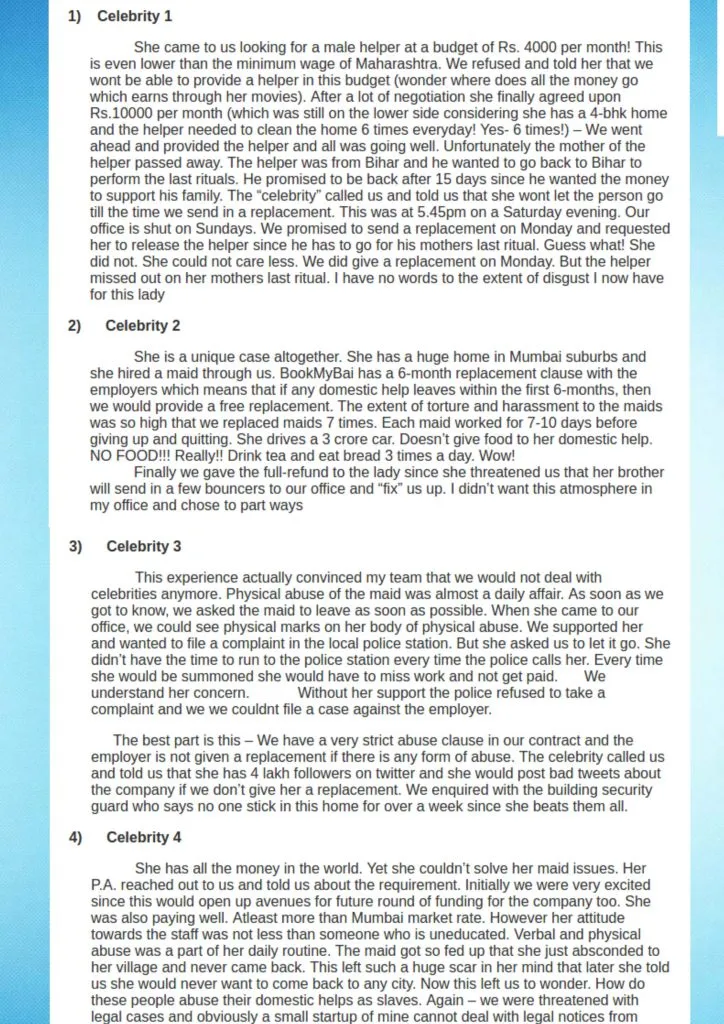The celebs' assaults on BookMyBai's maids were horrifying, but how the maids reacted is even more saddening
Disenchantment has reigned over the startup ecosystem as revelation after revelation about harassment and abuse, the skewed gender ratio, and pay gaps exposed the crevices within the Wall of Troy that we thought we erected against the old order.
But one of the more recent cases, which I probed further today, made me feel like I was transported back to Saadat Hasan Manto's India, dystopian, especially for women, during the Partition.
(Translated from Urdu)
“(The doctor) said to the old man, 'Khol do.' (Open the window.)
The young woman on the stretcher moved slightly. Her hands groped for the cord which kept her salwar tied around her waist. With painful slowness, she unfastened it, pulled the garment down and opened her thighs.”
This excerpt is from the harrowing tale of a woman separated from her family during the Partition; “Khol Do,” wherein she had submitted to repeated abuse as her fate. And it hits too close to home even today.

The tormentors of the Partition era may have simmered down, but the victims–the women–continue to be tormented, while being denied complete agency, at the hands of another devious incarnation of humanity. And this one is more dangerous, for it is far more commonly found, and hence, way better camouflaged within the soiled tapestry of our social order.
These tormentors are all of us. Presumably, anybody who is capable of reading this article–typically middle class and above, economically stable, educated, English-speaking, and belonging to a supposedly higher social strata–is either party to this, or at least knows a peer who is part of the problem.
And the BookMyBai controversy is the epitome of this phenomenon.
Let us start at the beginning, though.
The issue
Bookmybai.com, a platform that acts as an online agency and aggregator for any domestic help one needs in urban households, has chosen to impose a blanket ban on celebrities seeking out their services. This drastic step follows a series of instances of abuse perpetrated against the domestic help deployed by them to celebrity households.
In an exposé-esque blog post, Anupam Singhal, the CEO and Co-founder of Mumbai-based startup BookMyBai, detailed the cases of harassment as relayed back to them by the domestic staffers, who were pushed to the extent of abandoning their contracts and even fleeing to their villages out of fear and disillusionment with the urban dream.
“The most extreme cases of abuse–physical, verbal, and mental–where a line was clearly crossed, always seemed to be perpetrated by our celeb clients,” Anupam tells YourStory.

BookMyBai claims to have provided domestic help to 20-25 celebrities across Mumbai, Hyderabad, and Pune. And somehow, most of those arrangements ended badly, with the maids and helps deployed returning and complaining about severe abuse. Among the five cases he has detailed, one help was almost held and disallowed from attending the last rites of his own mother because BookMyBai could not provide a replacement on short notice. While two others returned with clear scars and bruises on their body and confessed that beatings were part of the daily routine. One celebrity refused to pay a penny for the services she received for over a month, and another kept a full-time maid on nothing but tea and bread for days on end.
I ask him if it is a mere coincidence that these complains are only against celebrity clients, or whether it is by design–that there are certain qualities peculiar to the community that makes them prone to perpetrating abuse. “I think it is a sense of superiority. Them behaving this way in spite of knowing how difficult it is to find domestic help in India clearly proves that these celebs feel they can get away with anything,” he says.
“The very fact that they had to look for domestic help online, whereas the norm is still to find help through word of mouth, shows that they perhaps had a bad track record of abuse with the domestic help community in their localities, and would have exhausted all their options,” he tells us, adding, “We draw up a contract with the employer–stating that they cannot exploit any of the ladies or gentlemen deployed to their homes, that they have to pay on time and in full–but celebrities see this as just a piece of paper. They even know that BookMyBai banning them will not matter, because they can simply use any other portal.”
The perpetrator's aggression
While BookMyBai has recorded a pattern in the string of complaints they have received, there is a larger phenomenon at play here. Both men and women were abused, and at the hands of both men and women celebs, over a span of a year and a half. This is definitely not just a celebrities-versus-commoners issue, but a much wider class issue. These are crimes perpetrated against members of economically weak, and hence "socially backward" and supposedly "inferior" classes.
Now, this community–the maids that service you in your house, that are aggregated by platforms like Bookmybai.com, and in fact, anybody engaged in unskilled labour–is largely made up of members of economically weaker sections, which even a layperson usually sees as inferior.
Add to that the fact that we, as a society, have no regard for dignity of labour, and consider many forms of labour–typically the kind of services we hire maids, help, and service personnel for–“beneath” us. All this contributes to making the relationship of a house help and the house owner that of a subordinate and a boss, very similar to the relationship between a slave and a slave owner.
Even if one does not directly assault them out of a feeling that they are "lesser" mortals who one is entitled to treat as per his or her whims, the sense of superiority and power has many other ways in which to manifest.
The assault here comes from the same place that other discriminatory behaviour comes from. Setting aside separate vessels for your domestic help to eat and drink out of, giving them a mat in the kitchen to sleep on, even as your guest bedroom lies empty six days a week. Yelling 'shotgun!' while driving anywhere with peers, but instinctively not sharing the front seat and sitting in the back during your taxi rides. (Stay tuned for the hard-hitting results of an ongoing social experiment we are conducting with regard to the last)
This list is endless and all-encompassing, in every public and private space we share with people from different communities and economic backgrounds.
And the victim's submission
While we have addressed the problematic behaviours people have deeply internalised against their societal peers of diverse backgrounds, a more disturbing phenomenon that came to light was the reactions of the assault victims from BookMyBai upon being violated.
“Most of these maids come from economically backward backgrounds, and don't have the time or resources to file cases and follow up. They think it is a very regular affair, very commonplace–something that happens in their own homes even. So, at some level, they expect it to happen. They choose to just move on, and simply come back to us and tell us, 'Just find us a new employer.'”
This is the “Khol Do” of our time.
The domestic workers expect assaults as what they are fated to undergo, because of the socioeconomic backgrounds they were born into. For them, the status quo permanently puts them at the end of a stick. If not the beating itself, it is the constant expectation of it that has made them numb to their realities ridden with violation. For them, it is not a life of pain, it is simply life as they know it.
And even if they do not expect to be assaulted, they sit on the floor as you sit on your sofa; they use the “service lift” in your building, they collect your trash for disposal and your clothes for ironing while maintaining an arm's distance, beyond the threshold of your door.
This is the “Khol Do” of our time.
In the case of these assaults, none of the victims have chosen to press charges. Because of the fluid nature of the workplace in the case of BookMyBai, where the startup is not the employer, but a facilitator, and the employer is actually the household, the provisions of the Sexual Harassment at the Workplace Act do not apply. In this case, the person who has been abused needs to first speak up and press charges for BookMyBai to be able to go after the abusers. "We would like to go all out in bringing them justice. But without their consent, until the maids record an official statement, we cannot do anything,” Anupam tells us.
What BookMyBai is doing to overcome this
The scale at which BookMyBai operates–with over 2,000 personnel deployed every month to multiple cities–makes vetting the households impossible, says Anupam. Hence, they have created a 24x7 helpline, and encourage their domestic workers to pack up their bags and leave in case anything goes wrong. “Moreover, we sensitise them through an induction programme as well, wherein we tell them what is acceptable and what isn't. We encourage them to stand up for themselves and take action when their rights are violated. We call ourselves a social platform–because we often provide opportunity and employment to the marginalised communities in times of need–and we expect the households we work with to treat them with no less dignity and respect,” says Anupam, signing off.







